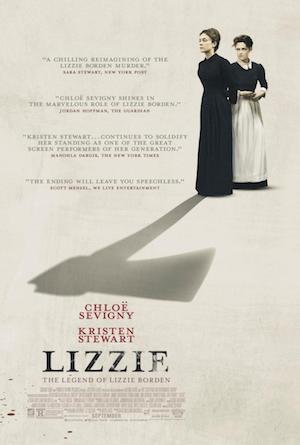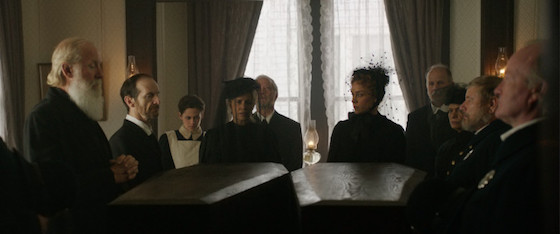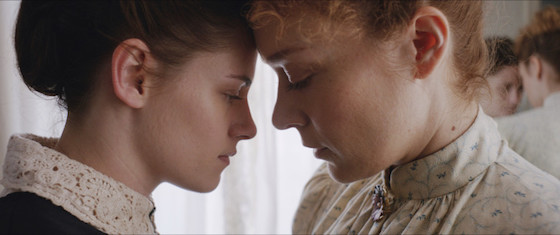

[Rating: Minor Rock Fist Up]
A somber retelling of an American tragedy projected through the #MeToo lens, Lizzie is a hundred-plus year-old tale that feels right at home in 2018. The story of a double murder in a sleepy 19th century New England town, the film explores several timely topics ranging from parental abuse, sexual assault, and good old-fashioned greed. And while it doesn’t knock down every target it sets up for itself, Lizzie succeeds when it matters most, and breathes some new life into a murder mystery that has captured imaginations for over a century.
The movie opens during a crime scene interrogation of Lizzie Borden (Chloë Sevigny), who is answering questions for a policeman not far from her father’s mutilated corpse. The film then jumps back to the hiring of the household’s maid, Bridget (Kristen Stewart), some months before. Bridget is Irish, and quickly forms a friendship with Lizzie, who is the only person in the house who seems to see through Bridget’s station as a hired hand. Both women are trapped in their respective roles as a result of their ethnicity and/or gender, and each seems to want something more out of life.
The house is a full one, what with Lizzie, her older sister Emma (Kim Dickens), their stepmother Abby (Fiona Shaw), and their father, Andrew (Jamey Sheridan). And while Emma and Abby seem content to keep their heads down, and play the passive roles assigned to them, Lizzie has a rebellious streak. Keen on getting out of the house, and even acquiring a little culture, Lizzie pushes back against her father’s controlling nature and tries to forge her own path. Along the way, Lizzie discovers an unlikely ally in Bridget, and what begins as a platonic friendship begins to blossom into something more romantic.
 Having opened with the aftermath of the murders, all of this comes as an understood preamble: as the groundwork for something awful. Most people know that things come to a head (literally) with the axe-murders of Lizzie and Emma’s father and stepmother. What the story needs is a spark, and the kindling comes in the form of Abby’s brother, Uncle John (John Morse). John is set up as a cruel, duplicitous creep who Lizzie learns will control her father’s estate in the event of the patriarch’s passing. No longer able to look forward to the day when her father dies, when she can do whatever she wants, Lizzie begins to think desperate thoughts.
Having opened with the aftermath of the murders, all of this comes as an understood preamble: as the groundwork for something awful. Most people know that things come to a head (literally) with the axe-murders of Lizzie and Emma’s father and stepmother. What the story needs is a spark, and the kindling comes in the form of Abby’s brother, Uncle John (John Morse). John is set up as a cruel, duplicitous creep who Lizzie learns will control her father’s estate in the event of the patriarch’s passing. No longer able to look forward to the day when her father dies, when she can do whatever she wants, Lizzie begins to think desperate thoughts.
Director Craig William Macneill and screenwriter Bryce Kass have a tricky job with all of this, as they have to stretch a handful of bloody minutes into a feature-length film. By starting with the murder’s aftermath, they establish the stakes, then fill in the blanks about how things came to pass. It is a sound strategy and works well for the sake of the narrative since the murders themselves aren’t seen until the third act. Most are going to walk into Lizzie knowing what “happens,” so it’s not like anything is ruined with this approach. It’s just that there’s a lost element of suspense, here, and it is something the picture can’t ever seem to recover.
Things aren’t helped by the composition of the characters, either: most notably Lizzie and Bridget. Stewart plays the latter maid character like a spooked cat most of the time, and while this might be true to her character, it doesn’t make for an engaging viewing experience. Lizzie is even more of a problem, for while the audience will likely sympathize with her attitude and disposition, Sevigny plays her with a pent-up stoicism that just doesn’t play well on the screen. As presented, it is hard to get to know her, and even more difficult to get on her side. Like Stewart’s portrayal of Bridget, the Lizzie rendering feels authentic to the reality underpinning all of this, but that’s also what makes it feel somewhat inaccessible.
 As the movie develops, and the conflict between Lizzie and her father boils over, the tension bubbling up beneath the surface begins to show, and a delicious whiff of bloody anticipation overtakes things. It’s a credit to Lizzie that the movie is able to reach this fever pitch after its opening set-up; again, the fact that Andrew and Abby die is never in question, yet just how that comes to pass, and who is involved, does form the basis for a fascinating exploration, here.
As the movie develops, and the conflict between Lizzie and her father boils over, the tension bubbling up beneath the surface begins to show, and a delicious whiff of bloody anticipation overtakes things. It’s a credit to Lizzie that the movie is able to reach this fever pitch after its opening set-up; again, the fact that Andrew and Abby die is never in question, yet just how that comes to pass, and who is involved, does form the basis for a fascinating exploration, here.
The look and feel of Lizzie sets it in a particular time and place more than any title card stating the date as 1892. Macneill sucks all the color out of his costumes and sets, and is sparse with the score, highlighting just a few piano notes and violin screeches to denote the rising tension. The costumes for the women all seem suffocating, and the shadowy lighting adds to an overall penal feeling of confinement. This is altogether appropriate, too, as the murders are very much the result of the repressed reaching out in desperation for some semblance of freedom.
Opening this week, Lizzie is a prescient drama whose only real failing is adhering too closely to the thematic and historical truths of the event in question. Performances that are simultaneously appropriate yet inaccessible keep the audience at arm’s length and handicap this one a bit, yet it still manages to be provocative and engaging. Deliberate and exacting, the film is never slow, which seems altogether fitting, as it would be a shame if the story of Lizzie Borden was mired in boredom.





Comments on this entry are closed.